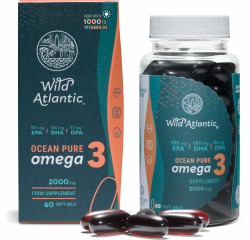All humans are endowed with a natural immune system which is our frontline defence against infection, and cannot be outsourced.
It is our most important protection against infections from winter colds and flu. A healthy, balanced immune system protects the body from invading pathogens. Being well prepared can help to prevent us from becoming really sick on the colder, darker, winter days.
Our Nutritional Therapist Barbara Barrett has a wealth of experience and natural wisdom as a health practitioner. We asked her to share her top 10 tips for boosting immunity and preventing a nasty bout of flu this winter.
Barbara’s recommendations are as follows:

1: Vitamin D
I suggest taking extra vitamin D3, at least 4,000iu per day, to boost immunity, and if you feel a cold coming on, increase the dose.
Most people are deficient in Vitamin D, especially those who live in latitudes with long winters. The most important thing is to know your levels to know if you’re getting enough and what you can do about it. Always take vitamin K2 with your D3, as it helps to channel calcium into the right places, like your bones and teeth.

2: Vitamin A
Powerful anti-viral vitamin A is an absolute must to fight viruses. I suggest taking it in the Retinal form (found in natural beef and cod liver).
Many people can’t convert beta carotene efficiently into vitamin A, which regulates the functions of various innate and adaptive immune cells and decreases RNA virus replication.
I recommend a Daily dose of 10,000 IU unless you’re pregnant, in which case we would suggest reducing levels to 750 IU per day.

3: Vitamin C
Vitamin C can help prevent and treat respiratory and systemic infections.
Your body can’t produce it on its own, and a minimum dose of 1000 mg is required per day.
Vitamin C acts as an antioxidant, meaning it can protect your body from toxins that cause inflammation in your body. If you feel a cold or flu starting, dose to 1000 mg every hour - but be aware of your bowel tolerance.

4: Zinc
Zinc plays a central role in your immune system and slows the replication of a cold virus. Deficiency in this mineral makes you susceptible to infections. While I suggest 45 mg of zinc per day as a preventative, at the first onset of flu symptoms, a zinc acetate lozenge of up to 80 mg per day can also reduce symptoms and duration.

5: Quercetin
Quercetin helps escort Zinc into the cells, acting as an ionophore. It has powerful antioxidant and anti-inflammatory effects and has been studied for its potent antibacterial and antiviral benefits against the flu. We recommend using at least 250 mg per day.

6: Omega-3
Top-quality Omega-3 is known to strengthen the immune system. Omega-3 fatty acids impact immune cell functioning and increase cellular membranes’ fluidity. EPA, DHA and DPA have anti-inflammatory effects and pro-resolving healing properties.

7: Wholesome Food
Cut the sugar and start eating wholesome, nutrient-dense foods. Sugar depresses your immune system and literally feeds the bad bacteria in your digestive tract that, when overpopulated (by sugar), allow those nasty bugs such as viruses and bacteria to take hold.
During winter, bone broth is nurturing and added garlic has a powerful antibacterial effect. Include a variety of vegetables and fruit in your diet, such as citrus fruits, berries, kiwis and leafy green vegetables. Plants contain antioxidants, polyphenols and fibre - all of which protect you by supporting immune health.

8: Sleep
Sleep is a foundational pillar in how well our immune systems function. Aim to get natural light during the day and 7-8 hours of quality sleep each night. Sleeping in a completely dark room also improves melatonin synthesis.
Taking glycine or magnesium glycinate before bed helps relaxation. Avoid blue light devices an hour or two before bed. I make a warm Turmeric latte in the winter evenings to help me sleep! Add turmeric, a twist of black pepper, cinnamon, ginger, honey and coconut milk.

9: Gut Health
Good gut bacteria, including Acidophilus, play a pivotal role in immune health. In addition, broad-spectrum probiotics assist in good T-cell production. As much as 70% of the immune system is controlled by what goes into the gut. Adding fermented foods that are rich in probiotics, like kefir, yoghurt, kimchi, natto, pickles, cheeses, and olives, helps us fertilise and create a more diverse and abundant Gut Garden in our body.

10: Hydration
Keep well hydrated. The need for hydration increases if we are fighting an infection.
Water flushes out toxins from the body, oxygenates the blood and encourages the production of lymph fluid which is a crucial part of our immune system. Gargling with salt water 3 times a day for 30 seconds can deactivate and remove the cold virus where it loves to set up residence.
Plenty of water and herbal teas, including ginger and peppermint, boost blood circulation and help the body regenerate lymphatic cells. Aim to drink up to 1 litre of water per 25kg of body weight. Last but not least, on the subject of water, ensure you wash your hands thoroughly as unconsciously touching our face and eyes allows harmful bugs to enter the body and pass things onto others.
Desmond Tutu once wisely said that “there is only one way to eat an elephant: a bite at a time.” I think the best thing is to make a start and do what you can while building healthy habits. Even if you don’t do all of the 10 things on our list, each one will positively impact your immune system health. Leave a comment and let us know how this helps.
Other articles about Vitamin D

Why supplementing with Vitamin D3 has become critical
As a Holistic Health Care practitioner, working with nutrition and lifestyle to create robust health for my clients and me, there are several supplements I

Why is Vitamin D so important?
Early science understood the calcium homeostasis role of Vitamin D and bone health. However, we now know that vitamin D plays a major biological role

What serum level of Vitamin D should I aim for?
Looking back to the early 20th century, it became known that vitamin D deficiency, brought about by lack of sunlight, caused rickets in young children.





























